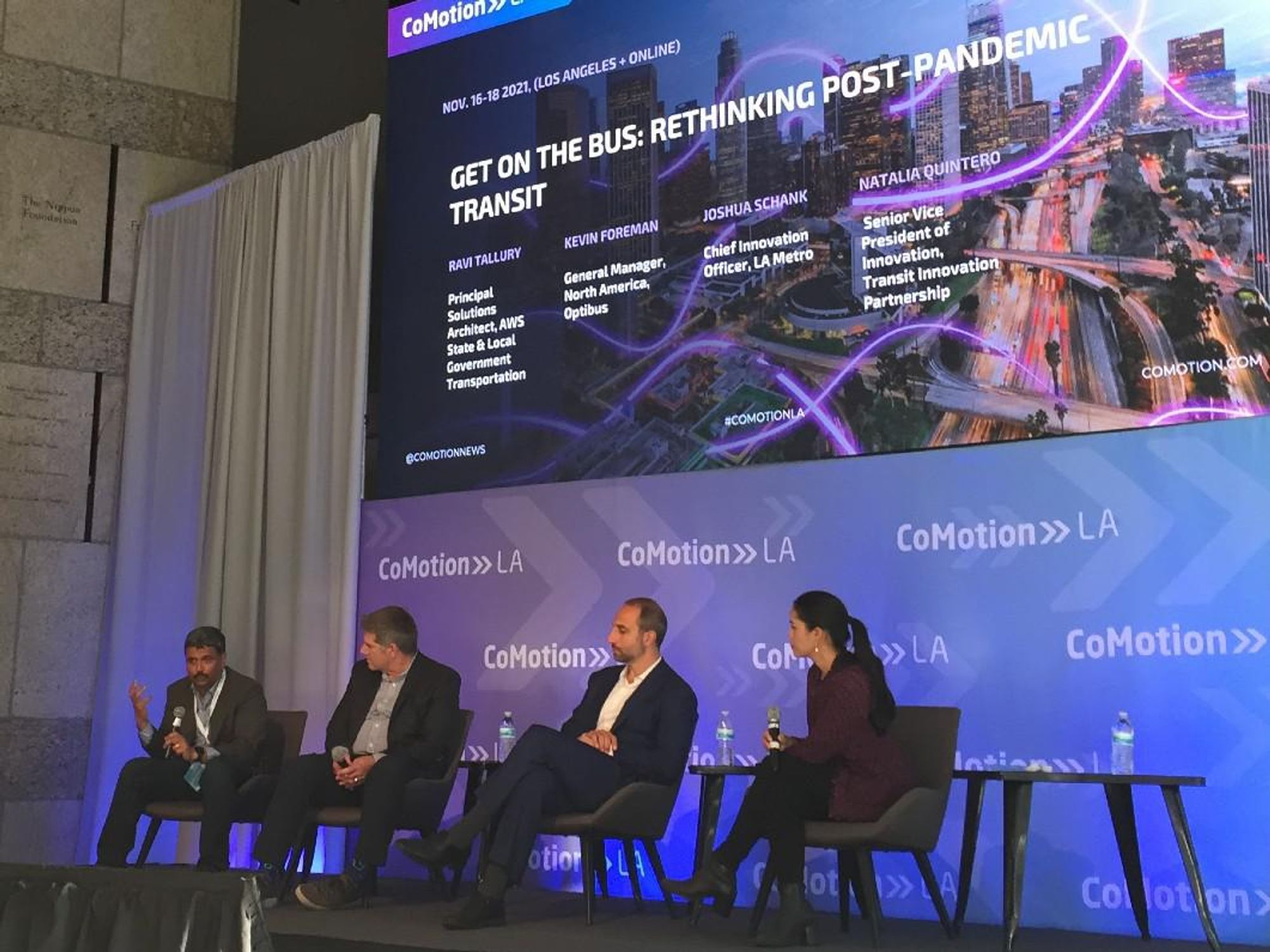4 Things to Watch At This Year’s Tech and Mobility Conference

CoMotion L.A., the annual transportation and technology conference focused on urban mobility, is taking place in Little Tokyo this week. This year’s theme, “The Multimodal City,” brings together public and private players from a range of transportation and mobility spaces, including public officials from cities that span from Los Angeles to Paris and a broad swath of tech companies, including Lacuna, Waymo and BP Pulse.
On the agenda: How do we electrify everything, collect data, reduce emissions, get people out of gas-powered, tire-burning vehicles and into something greener, safer and more equitable (i.e. trains). On the minds of many at the conference will be the billions of dollars the federal government has allocated for new transportation infrastructure.
But first things first: How do you host an entire conference on the multimodal city without a single workshop or panel focused on micromobility or active transportation (biking or walking)?
Oh, wait — there’s a fireside chat called “Sustainability in the Slow Lane” with no listed speakers. Um, it’s only the slow lane if you’ve never zipped past L.A. rush hour traffic on a bike or scooter, Brian. Snark aside, it’s frustrating to see more sustainable and healthy forms of mobility characterized primarily as “slow.” Sure, speed is great, but have you ever biked down The Strand during sunset? Also, the lack of programming on pedestrian and cyclist safety is disappointing.
If micromobility is out, then UAM (urban air mobility) and AAM (advanced air mobility) and eVTOLs (electric vertical take-off and landing aircraft) are in. Space may be the final frontier but investor eyes are fixed on more terrestrial solutions. When it comes to aerial ridesharing, cities are still trying to figure out what will fly: “How should community acceptance be defined, and what is needed to achieve it?” asks one workshop. CoMotion will attempt to answer this and other questions in panels and workshops, drawing on industry players such as Supernal and Overair, the company that announced a partnership with nonprofit Urban Movement Labs to bring aerial taxis to L.A.
Here are some other highlights we’re looking forward to:
The Future of Transit Payments
As L.A. Metro develops and expands its new mobility wallet (set to launch next year), it will be interesting to hear how the agency is reaching unbanked customers often ignored by big tech companies. Metro is also contemplating raising fares and instituting fare-capping, a change that advocates say could hurt the estimated 20% of riders who pay with cash. We’ll be looking at what measures the city is planning to put in place (if any) to make sure its plans for the future don’t leave behind its most vulnerable travelers. Metro might also be set to announce which private mobility players it will be integrating into the mobility wallet — will Angelenos be able to pay for a Lyft or Lime ride with their TAP card or app in the future, setting the city on the path to true multimodal bliss?
Creating a ‘Universal Basic Mobility’ Toolkit in Los Angeles
In conjunction with the mobility wallet it is developing, L.A. is launching the biggest experiment in “universal basic mobility” (UBM) in the country, with 2,000 total people enrolled from South L.A. Participants will receive $150 per month to spend on multimodal transportation from private companies (like Uber) and public transit agencies (like Santa Monica’s Big Blue Bus). This panel will explore how all the different elements of the UBM pilot will work together. We’ll be looking at how LADOT is partnering with nonprofits in South L.A. to get the word out about the pilot, future infrastructure improvements for bikes and pedestrians and how the agency plans to measure success.
Bringing Streetcars Back to LA: A Design Visioning Exercise
A workshop sponsored by ArtCenter College of Design takes inspiration from L.A.’s past to envision its future. If you are occasionally struck by nostalgic yearning for a less car-centric city connected by street cars instead of freeways, then this experience may be for you. Hopefully there won’t be too many urbanists crying into their coffee.
The Urban Frontlines of the Autonomous Rollout
With robotaxis coming to L.A. in the near future, it’s worth looking at lessons from other cities (i.e., San Francisco). Waymo is already seeking community buy-in and recently partnered with Bike LA (formerly the L.A. County Bike Coalition). Will Angelenos embrace autonomous technology on already clogged streets? Will robotaxis play nice with bikes, scooters and pedestrians? We’re looking forward to some healthy debate and the presence of Alex Roy (podcaster at Autonocast) seems like a good sign.
- Column: Conference Season Is Here. Are They Worth It? ›
- At Electrify Expo 2022, Cars Aren't the Only EVs Sparking Interest ›
- CoMotion LA ‘22: The Multimodal City: Here, There, Everywhere ›





 Image Source: Tinder
Image Source: Tinder Image Source: Apple
Image Source: Apple